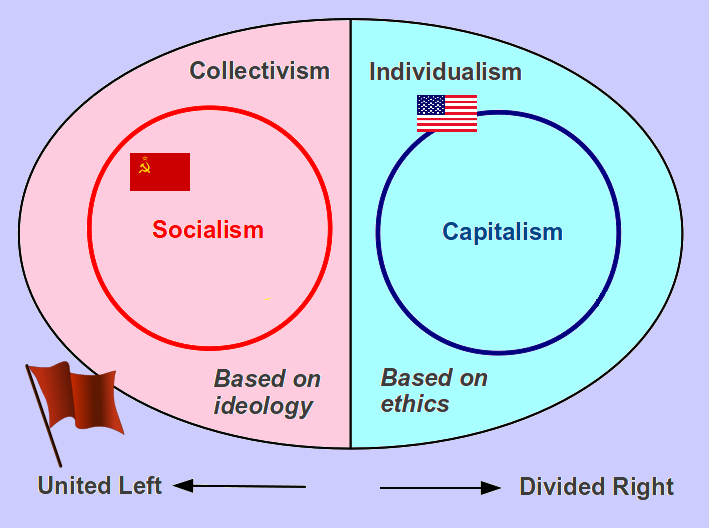Page
last
modified March 18, 2021.
Ideology versus Ethics
by Dr. Marek A. Suchenek
October 22, 2015
Copyright and all rights
reserved
This article is posted here
for in-class use only. No other use or uses is/are allowed.
Quote from Sara
Baase's The
Gift of Fire:
"[Ethics]
assumes
people are rational and make free choices."
One of the visible effects of fast proliferation of computer-based
information technology on today's American society is a tendency to
gradually replace natural ethics with simplistic ideology. For instance, recent advances in such trendy areas of science as Artificial Intelligence and Predictive Analytics have produced powerful computer-based tools with which one can try to implement and advance utilitarianism (whose definition of "good" requires predicting of consequences of actions) and its ideology.
Unlike ethics, ideology assumes people are not rational and need
to be submitted to it (ideology) thus preventing them from making free (allegedly bad)
choices. It assumes that they cannot tell the truth from the falsehood,
or right from wrong. It assumes that people's natural sense of right
and wrong that they developed over many generations, and their
attachment to natural rights,
are detrimental to humanity and need to be controlled, augmented, and
changed. (The latter is often being carried on by means of social engineering.)
For those reasons, ideology distrusts (and often
dismisses) free-market and competition and attempts to replace them
with something else, for instance, with central planning (that has never
worked) and social leveling (that caused misery and preventable deaths
of tens of millions of people). In its extreme, ideology assumes that people are stupid and evil, which implies that they should not be allowed to make free choices but be treated as sort of livestock by their wise government, instead.
Ideology puts ideas (however flawed, untested, and half-baked they can be) before the People.
Thus it puts the ideas before the humanity, although it usually claims
the opposite. Ideology attempts to submit the People to ideas, and as such it is irreconcilable with individual liberty,
although it usually claims the opposite. In fact, ideology is a threat for liberty. It is not surprising that
ideologues are searching for submissive people with whom to replace the
current Americans who "cling" to their individual liberties and the
menas of their protection.
Ideology, like sophistry, is a form of assault (usually, on individual liberty) that exploits people's cognitive vulnerabilities for specific political gain (usually, redistribution of property by means of its uncompensated appropriation).
It's worth noting that the Preamble to the U.S. Constitution puts the People before everything else;
hence the freedom and prosperity of the American nation. Of course, if
Americans were
mostly wrong people, or stupid and evil as the extreme ideologues seem
to assume, our nation would not have been nearly as exceptionally free
and prosperous as it has been. (Never mind millions of immigrants who
"vote with their feet" what is the best nation to be a member of.) In
particular, the ideology of the
so-called
"proposition nation" contradicts the above mentioned sentiment expressed by the Preamble to the Constitution and the exceptionality of the American people.
"Ideologies
aim to transform society.
Other systems of belief do not involve such a commitment [...]."
Ethics is a formal
expression of morality that captures natural
comprehension of right and wrong shared by a group (e.g.,
society) of free and rational individuals. It slowly evolves with the nature
of those individuals as they and their ancestors build more and more
sophisticated society that respects and protects their natural rights. The said social evolution is kept in check by
the reality they live in
and by the natural selection that it entails. If the actions of the
members of the group, motivated by their ethics, are adaptive then the society they build becomes
sustainable. If, however, those actions are maladaptive
then it becomes unsustainable and enters on a path to its gradual
extinction.
Ideology does not need
ethics. It is based on a set of claims and postulates how to
"intelligently" design a society. Neither natural selection nor a compatibility of the ideology with human nature
and morality are considered necessary
for the said "intelligent design" to succeed. Ethics, as well as the morality it expresses, have often been
portrayed, by the ideologues, as obstacles
in implementation of
ideology because many individuals reject some ideological calls for
ethical reasons. In particular, many individuals refuse to submit
themselves to ideas, particularly when they find those ideas
morally guestionable. Ethics and morality have been also portrayed as "outdated" because they
make it more difficult for the ideologues to "update" the society. This is particualrly true in the U.S. whose "conservative" Constitution offers a powerful means of resistance to any such "updates".
When under pressure from prevailingly ethical individuals, the
ideologues yield to the will of the majority and declare themselves
"ethical". However, the
utilitarian "ethics" they usually adopt is trivial
and a caricature of natural one. They proclaim that everything
that helps implementation of their ideology is good and everything that
obstructs it is evil. Such a semantical trick yields the utilitarian definition of good as anything that increases the utility.
This deceptive measure allows some otherwise well-meaning and ethical
individuals to jump on the bandwagon of ideology and submit their
natural sense of right and wrong to ideological self-censorship.
That
fact itself explains pathological tendencies of ideology-based societies as individuals who have
excused themselves from breaking ethical rules for the "grater cause"
(the ideology, that is) have a potential of turning themselves into
monsters of oppression and ruthlessness once vested with political
power. It strongly suggests that ideology
is the root cause of many socio-ethical problems that are plaguing the
West, for instance, a tendency to eliminate morality from social
interactions (which contributes to - among other wrongs - mass shootings) and an increase in opportunistic attitudes among individuals, just to name two.
From the above perspective, there is nothing surprising about the
atrocities of ideologically driven governments and ruling
cliques, in particular, those headed by Robespierre, Lenin, Hitler,
Stalin, Mussolini, Zedong, Pol Pot, and many others.
Here is a quote from
John Kekes
"Why Robespierre Chose
Terror;
The lessons of the first totalitarian
revolution,"
City Journal, Spring 2006
"Castigating
Robespierre more than 200 years after his death would have little point
if he were not the prototype of
the ideological frame of mind that is
very much with us today. If we understand him, we understand
that it is utterly useless to
appeal to reason and morality in dealing with ideologues.
For
they are convinced that reason and morality are on their side and
that their enemies are irrational and immoral simply because they are
enemies."
Note (by M.S.) If ideologues cannot silence their critics
then they seem to have a fallacy
for every occasion when they are out to defend their ideology and the
facts that those critics bring up. Such a defense is known under the name of sophistry.
|
So, if you are
not willing to engage
in a rational discourse with your adversary (with
whom you disagree on issues) and would rather have him silenced,
instead, or you would rather resort to fallacious
arguments (a.k.a. sophistry) in order to win the debate (this was exactly what the sophists were doing) then you may have a natural propensity to
ideology and/or collectivism. |
The source of ideology
Some roots of today's ideology in the Western countries, including the U.S., can be traced to Russia, former Soviet Union (a major source of activist ideologues in the U.S.), and Germany (cultural Marxism that was conceived in 1920s at University of Frankfurt originates from there). The ideology was injected into the American society via public education system, several major mass media, and entertainment.
"Many
people, of course, do not choose the ideology they hold but
acquire it
through indoctrination. It may be too much to demand of them
to resist
indoctrination, if it is persistent and sophisticated, and if
they know
of no reasonable alternatives. Not being able to resist
ideological
indoctrination, however, is one thing; committing atrocities
in its
name is quite another. People do have a choice as to whether
they
torture or murder. Decent people will question their ideology
if they
see that it leads to inflicting horrors. And if they do not
question it
and commit atrocities, then they are justly held responsible
not for
what they believe but for what they have done." [John Kekes,
op.cit.]
Ideologies of the Left
MARXISM AS PSEUDO-SCIENCE
http://www.reasonpapers.com/pdf/12/rp_12_3.pdf
Postmodernism: The Destruction Of Thought
http://rayharvey.org/index.php/2009/11/postmodernism-the-destruction-of-thought/
|
"Whereas modernism preached reason and science, postmodernism preaches social subjectivism and knowledge by consensus.
Whereas modernism preached free-will and self-governance, postmodernism preaches determinism and the rule of the collective."
|
Collectivism does need ideology, while individualism does not.
Individualism does need ethics and - therefore - has to promote individual freedom and rationality in order to survive and prosper.
There is no such thing as a
"Right-wing ideology" in America ;
;
American "Right-wing" is associated with individual freedom while ideology expects submission.
"Right-wing" is associated with individual freedom while ideology expects submission.
If something is ideological (or political) in America then it usually belongs to the Left. If it is profoundly ideological (or political) then it belongs squarely to the Left.
Footnotes.
1. See Slides for Chapter 1, slide 106.
2. Ideology
should not be confused with idea(s)
or idealism.
3. Adaptive
act (or behavior) is an act (or behavior) that increases actor's
chances of having offspring that will survive to their reproductive age.
4. Maladaptive
act (or behavior) is an act (or behavior) that decreases actor's
chances of having offspring that will survive to their reproductive age.
5. For instance, the failures of socialism have
been often attributed to its incompatibility with the
human nature.
6. Unless one irrationally assumes that some
forms of socialism or collectivism (both being opposites of
individualism) are "Right-wing" (see the diagram, below).
;
"Right-wing" is associated with individual freedom while ideology expects submission.
